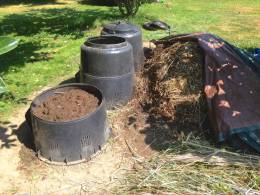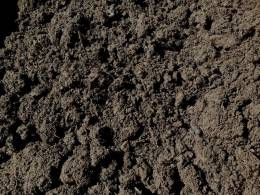Table of Contents
Making compost
Like a lot of topics in gardening different gardeners have very different ways of composting organic material.
I recommend Steve Solomon's book Organic Gardener's Composting (see Steve's composting book) for proven techniques for making good compost. I need to get the best compost in the shortest time.
Two classes of compost
 I keep two classes of compost bin/piles:
I keep two classes of compost bin/piles:
- Quality: selected green (fresh) and brown (dry) matter that decomposes in less than one year
- Slow: (whatever takes longer than a year to decompose)
The quality compost I cure in bins. The slow I keep in piles covered with tarps. This year I have enough of each so that when I apply the quality compost to my garden I take some year-old slow compost and mix it with fresh greens and browns from the garden.
I used to call this junk compost but my experience composting corn stalks, leaves and husks has shown that if I turn the pile and keep a good mixture of browns and greens, the within a year the “slow” compost can be completely decomposed.
A short course
Briefly, my procedure for good compost is to:
- Chop everything into small pieces
- Combine green and brown material in layers
- Ensure just enough (and not too much) moisture
- Regularly turn the compost
- Check and adjust moisture content regularly
- Turn the compost (yes, again)
Good compost requires attention and care, just as growing vegetables does. The process is slower but important for having rich, cured humus for the next season.
 The devil is in the details and good compost takes as much time as a stand of healthy veggies. In my situations it has taken years to develop the techniques of making good compost (but I was looking for a quick and easy way). Thankfully, at least once or twice I have succeeded. Here's what (pretty) good compost looks like, with apologies to the worms whom I disturbed in relocating the compost.
The devil is in the details and good compost takes as much time as a stand of healthy veggies. In my situations it has taken years to develop the techniques of making good compost (but I was looking for a quick and easy way). Thankfully, at least once or twice I have succeeded. Here's what (pretty) good compost looks like, with apologies to the worms whom I disturbed in relocating the compost.
Compost booster
I use this compost accelerator recipe to accelerate decomposition of a compost pile when there are too many slow-decomposing plants in it.
Composting rules
Things I don't do based on experience and the fact that I want good, cured compost, that doesn't pass on weeds to the next patch, and I want it within 12 months:
- No wood products (twigs, etc.) except leaves, and these only sparingly (I have only maple leaves and they take 18 months to decompose)
- No perennial weeds, such as perslane or sheep sorrel
- No rhizomatious weeds (some shoots and rhizomes appear to survive composting)
- No weeds with mature seed heads
- No tomato or potato clippings (these can perpetuate bad fungi)
- No forgetting it's cooking! I maintain a balance of moisture for the duration.
